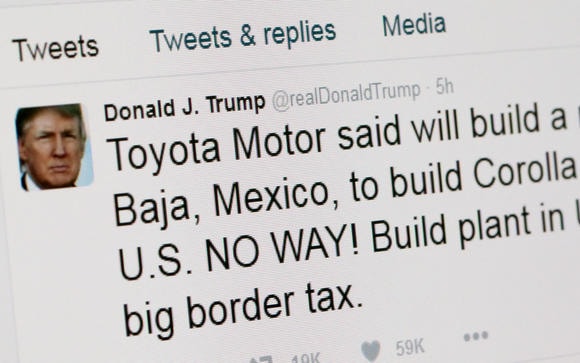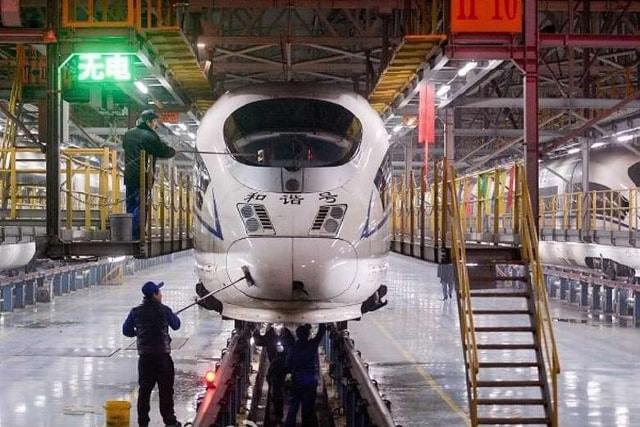Virtual and real world
(Baonghean) - Real life and the virtual world today always have certain areas of overlap, even with increasingly clear trends. While the US President-elect "borrowed" the social network Twitter as a communication and interaction channel, instead of traditional "real" press conferences, Chinese netizens also expressed their concerns about air pollution on the social network Weibo.
 |
| US President-elect Donald Trump “threatens” Toyota on his personal Twitter page. Photo: Nikkei. |
The US President and his Twitter addiction
On Friday, January 6, US President-elect Donald Trump “threatened” the Toyota car company on his personal Twitter page. Specifically, he declared that if Toyota insisted on opening a new factory in Mexico instead of in the US, it would be taxed heavily when importing cars into the US.
Of course, this status of Donald Trump immediately attracted the attention of the public with tens of thousands of responses and hundreds of thousands of likes. Perhaps in the history of the United States, no President has been as "addicted" to Twitter as Mr. Trump.
Indeed, right from the time of his election campaign, Mr. Trump chose Twitter as his main channel of communication and interaction with voters. He even used Twitter as a tool to fight against his opponent Hillary Clinton. Even after being elected President, he remained "loyal" to Twitter whenever he wanted to declare something to the community or express his political views.
Interestingly, the US President-elect seems to have no intention of changing his social media “style”. In his posts, letters are often capitalized “indiscriminately”, and exclamation marks appear constantly - reminding people of the way young people express themselves on social media.
According to statistics, since his election, Mr. Trump has posted 270 new status lines on Twitter, meaning that on average, Mr. Trump updates his Twitter account no less than 4 times a day. A surprising number and somewhat strange compared to the usual style of politicians. However, future White House spokesman Sean Spicer affirmed that using social networks with such frequency is part of a "campaign" and not to serve Mr. Trump's personal needs.
Perhaps it is not just an empty “excuse” because the truth is that the media is closely following Mr. Trump’s activities on Twitter. It also means that the US President-elect has succeeded in controlling the media, in a way. Remember that before being elected, Mr. Trump was mercilessly “buried” by the US media and continuously reported unfavorable information.
But now, the situation has completely changed and Mr. Trump is the one who controls the game. It is not an exaggeration to say that Donald Trump is the most surprising President in the history of the United States because of his erratic and unpredictable nature. But who knows, maybe that is just the outer cover for deep and unpredictable calculations?
 |
| China Railways has to clean its high-speed trains every day instead of every two days after photos of dust-covered trains appeared on social media. Photo: Weibo. |
Air pollution in China
For the fourth consecutive week, hundreds of millions of Chinese have been advised to limit outdoor activities as the north of the country grapples with a persistent smog crisis. Thirty-one cities remain on red alert, the highest level in a four-tier warning system.
The Chinese news agency Xinhua also reported that orange and yellow warnings are currently in place in 30 other cities. Perhaps people in these places are just hoping for the weekend to come quickly, as air quality is forecast to improve slightly thanks to a cold front that will bring rain and snow to many areas in northern China.
Snow fell in Beijing on Thursday, but the city’s meteorological bureau warned that the snow was “very dirty” and again advised residents to stay indoors. Frustrated by the prolonged poor air quality, it is no wonder that Chinese people feel “depressed, scared and angry”.
The country’s prestigious Global Times even warned that the thick smog could damage people’s trust in the government. If put on the scale, the economic losses are just a “whiff” compared to the massive wave of complaints from people living in the cities of the world’s most populous country.
On social media, people have noted a noticeable shift in sentiment during this latest haze. Breathing polluted air day after day, many are realizing that this is no longer the funny thing they once thought it was. Instead, people are wondering if there is a solution or if they will have to live with the haze for the rest of their lives.
A video clip circulating among Chinese netizens depicts future Beijing residents as having nose hairs as long as a hand to adapt to the city’s changing conditions. The video, with the message “If you don’t change the smog, the smog will change you,” was viewed 10 million times and liked more than 10,000 times on China’s Weibo social network on Wednesday.
Another article also became the center of discussion on Chinese social networks, when posting photos of a high-speed train covered in dirt after passing through areas affected by smog. China Railway had to speak up that they would clean high-speed trains every day instead of every two days like before! Not only that, on websites and social networking sites, there is no shortage of widely shared images of smog covering large cities, users also discussed enthusiastically about "escaping" from the heavily polluted urban areas they live in.
If the smog continues unabated, the virtual anger and anxiety on Chinese social media could translate into real-world changes. Many experts agree that Chinese people will move to smaller, cleaner cities, but if the situation worsens, middle- and upper-class Chinese will consider emigrating to other parts of the country.
Hai Trieu - Phu Binh
| RELATED NEWS |
|---|


